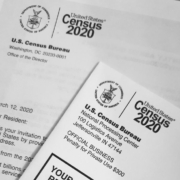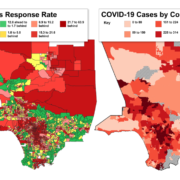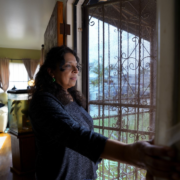COVID-19 Impacts on Minority Businesses and Systemic Inequality
In collaboration with Ong & Associates, UCLA Center for Neighborhood Knowledge recently released a new report on the temporal pattern of the pandemic, the resulting shelter-in-place mandates, and the emerging research on pandemic impacts on minority-owned businesses.
While previous studies have documented the pandemic’s impacts in marginalized neighborhoods on labor and housing markets, the report focuses on small businesses. This case study examines whether the COVID-19 crisis disproportionately impacted local businesses in ethnic neighborhoods in Los Angeles. Answers to this question provide academic insights on racial systemic inequality and inform policy interventions. If the disparities are significant, there are profound policy implications—race-conscious government efforts to address systemic racism are needed to ensure an equitable economic recovery.
Location data from SafeGraph are used to analyze foot traffic patterns to restaurants and retail locations in ethnic and comparison neighborhoods from February through September 2020. The results indicate an earlier and steeper decline in commercial activity in Chinatown and, while retail was resilient in ethnic neighborhoods, restaurants suffered greater declines on average than in comparison neighborhoods.
Overall, the ethnic neighborhoods collectively performed worse than the county as a whole prior to lockdown and performed no better than the county under shelter-in- place orders. This study contributes to the growing body of research around the disproportionate impacts of the pandemic on communities of color and recommends data-driven policy solutions to inform assistance and recovery policies and programs.
This project was partially supported with grants from the UCLA Luskin School of Public Affairs (funded by Southern California Grantmakers) and from the UCLA Asian American Studies Center (funded by the Stanley Kow Lau and Dora Wong Lau Endowment).
Access the full report here >>> COVID-19 Impacts on Minority Businesses and Systemic Inequality












Trackbacks & Pingbacks
[…] analysing smartphone data, a study he co-authored found that Chinatown experienced an earlier and sharper drop in foot traffic than other areas in Los Angeles prior to […]
Leave a Reply
Want to join the discussion?Feel free to contribute!